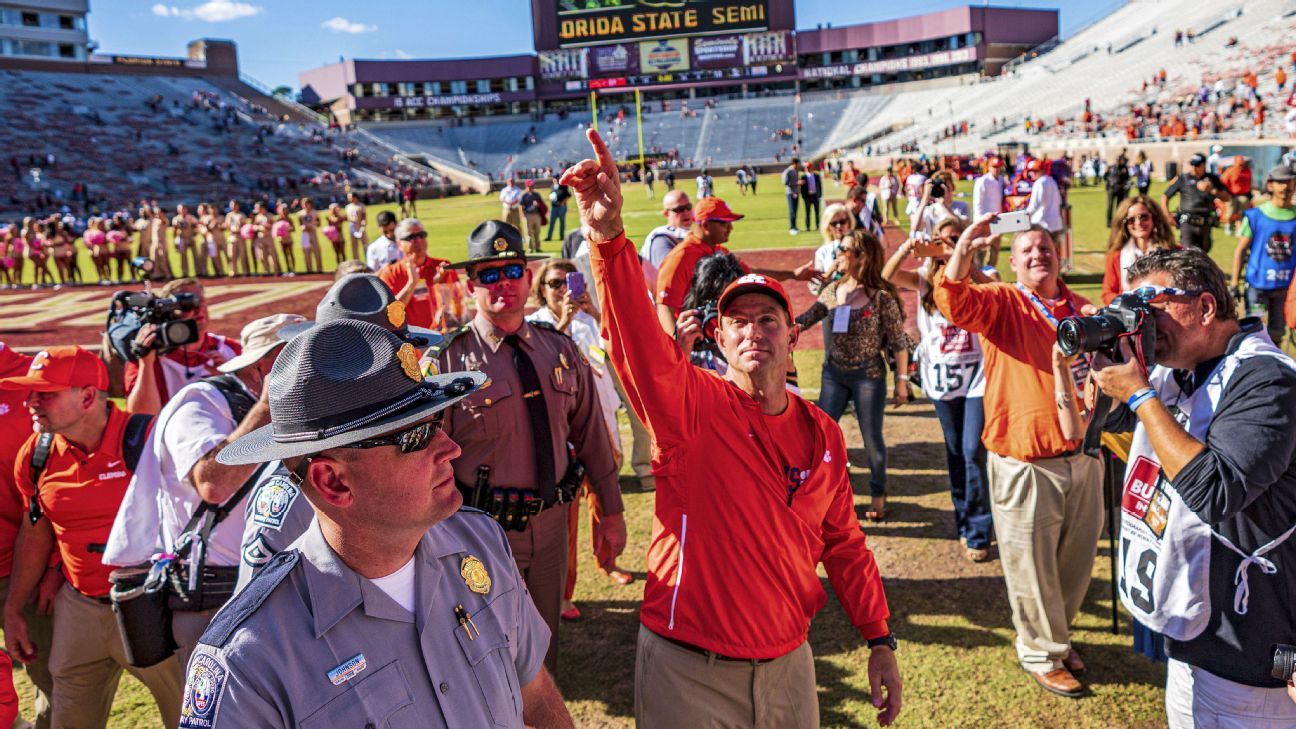Clemson’s players were having breakfast beneath a massive circus tent in the team hotel parking lot in Tallahassee, Florida, early Saturday morning, when offensive lineman Matt Bockhorst noticed something strange. Dabo Swinney was nowhere to be found. The head coach was never late for a team breakfast, and immediately Bockhorst knew something was wrong.
Sure enough, word began to trickle through the space, and then it became official: Clemson-FSU was postponed due to a positive COVID-19 case on the Tigers’ roster. Players from both teams felt like a rug was pulled out from under them, just hours before kickoff.
The response to Saturday’s postponement — or, as Swinney claims, forfeit — was swift.
Fans and players from both schools traded barbs on Twitter. Each side was trying to build its own narrative. Florida State, a 35-point underdog, was ducking a blowout, Tigers fans claimed. Clemson foolishly traveled with a symptomatic player, Seminoles fans retorted.
We were too ‼️ We good over here 👀 https://t.co/RzplTwn8FD
— J Rob (@JanariusD1) November 21, 2020
I smell fear
— walker (@walkerparks64) November 21, 2020
And the following days have produced a very public spat between the two programs, most notably with Swinney and Florida State coach Mike Norvell exchanging jabs and the ACC having to correct its original press release which implied Clemson had implied it was part of the decision-making process in the game postponement.
The frustration expressed by several coaches and staff in much of this was predictable. Now, the battle is being fought publicly, players are frustrated and two programs already muddling through a murky financial picture during the pandemic are on the hook for significant expenditures and revenue losses.
Along with the public sparring, there have been questions — around the protocols for both programs and how the conference let it get to this point.
Different protocols and gray areas
The roots of Saturday’s frustration took shape back in August, when the possibility that any college football games would be played in 2020 was tenuous. As one source confirmed to ESPN, numerous athletic directors then predicted chaos as ADs, coaches and medical personnel argued over contingency plans and testing procedures.
The surprising part, one coach said, was that it took so long for the problems to come to light, with the gray area built into the protocols resulting in a situation where both Florida State and Clemson could rightly claim they followed the rules, while arguing from completely different vantage points.
“We told the ADs this was going to happen,” one ACC coach told ESPN.
One ACC coach laid out the following hypothetical in August, as the league was still deciding whether to play football at all.
“Think of this scenario: A team comes to play us the last game of the season and if we win, we go to the ACC championship game,” one coach suggested. “Suddenly they decide they have 10 guys who can’t play so they have to cancel the game, which isn’t a forfeit and might put them in the championship game instead.”
From the beginning of the season, it was understood that the chief medical officers from both teams had to agree on game day that they were comfortable proceeding. If there was disagreement, the game would not be played. Everyone in the league was aware of this arrangement.
While the ACC considered appointing an independent arbiter to decide whether games should be played, the league ultimately decided to let medical personnel from each school make the final call. “After lots of discussion, all felt you had to leave it in the schools’ hands because of liability reasons and local jurisdiction,” a source said.
“That scenario could happen with any competition that we have, in any sport,” ACC commissioner John Swofford told ESPN on Tuesday.
With the scenario indeed playing out Saturday, it raised one mitigating factor for the postponement: Every program is handling the pandemic protocols differently.
When the ACC released guidance from its Medical Advisory Group in August, its protocols were based largely on CDC recommendations; but there was ample gray area, particularly due to the fact that the CDC guidelines are written for everyday activity, not football. The ACC guidelines for contact tracing, for example, follow a standard rule: Exposure within six feet of a COVID-19 infected person for at least 15 minutes in a 24-hour period.
But is that a reasonable standard for a tackle sport or just a casual conversation? One expert on the ACC’s advisory group suggested then it was impossible to know how significant that distinction should be.
Clemson pointed out that the player who tested positive was held out of workouts while experiencing symptoms and it took significant precautions to facilitate social distancing — using extra buses for transportation, and wearing masks and visors while on the team plane.
For Clemson, this underscores a key part of its argument: By the letter of the law, it followed all ACC guidelines. Swinney pointed to the Tigers’ game against Boston College on Oct. 31 as a prime example of how the protocols work. Star QB Trevor Lawrence practiced early that week despite showing mild symptoms of the virus, but he didn’t test positive until the Thursday before the game. Clemson held Lawrence out from there, in keeping with ACC guidelines, and the game proceeded without a postponement, with no other Clemson players missing action due to contact tracing or illness.
The key difference here, according to a source, is that Clemson traveled with a player who tested positive, and schools are keenly aware of several instances across the country where a player who unknowingly had the virus spread it to the team during travel. Baylor attributed its outbreak to traveling to West Virginia after what it believes was a false negative test, while Florida traced its issues to its trip to Texas A&M.
Though this was the first time a game was canceled on game day, it should not have been unexpected. Two weeks ago, after his team beat Virginia Tech in Blacksburg, Va., Miami coach Manny Diaz said the game was “on the brink” of being canceled and the final decision to play was made Saturday morning once it received all of its Friday tests.
As several coaches pointed out, different schools have their own guidelines for contact tracing — with some far stricter than others – depending on local guidelines and who is doing the tracing.
In Florida State’s case, Norvell noted he has kept players and coaches from any team activities, including travel to games, simply because they exhibited possible symptoms. Swinney argued “we have to trust the tests” and said it would be unfair to leave a player behind who had not tested positive.
Using the basic CDC guidelines, both programs are correct, and the league purposefully left interpretation of the rules vague, noting individual states and municipalities would have differing requirements.
“Risk is proportional to many things: proximity of two people, the duration and frequency of their contact, whether it is inside or outside, whether they are both masked, etc.,” ACC Advisory Group chair Dr. Cameron Wolfe said. “And each school is responsible for contact tracing, with the oversight of the local health departments associated with their campus.”
Then there’s the issue of timing. The ACC currently requires testing three times per week, with the final test coming within 24 hours of kickoff. This, perhaps more than anything, led to the problems for Clemson and Florida State.
The league spent weeks debating whether or not schools should have test results in hand before they get on an airplane or bus to travel for games. The Medical Advisory Group wanted the tests to occur as close to game time as possible, with the best test possible, so it settled on PCR testing the day before games. The testing would be done by an independent third party the ACC hired — “so the schools could trust the test results,” one league source said.
Those tests happen either upon landing at the game site, or on campus before leaving for games, depending on the campus location. The results take hours to process and are not known until late that night or early the next day. Allowing teams to travel without knowing who is positive seemed a risky proposition to some inside the league. “I always thought allowing people to test and then fly was a poor decision,” one source said.
The ACC is among the only leagues with this policy. Two officials from teams who played non-conference games against the ACC this season noted the difference between the ACC’s policy and their own leagues, with one suggesting this entire fiasco would have been avoided if the ACC operated as other leagues did. Another official said his team petitioned the ACC to allow testing on a Thursday night before travel to avoid exactly this scenario. The SEC, for example, tests on Thursday to ensure no infected players or staff travels with the team.
Earlier this year, South Florida AD Michael Kelly told ESPN, “When I travel, I want to know that everyone on that plane at least is negative.”
Lastly, there is the question of on-field transmission. What medical professionals know about the virus now compared to August is significant, and a season’s worth of games has offered ample data on the subject.
On Sept. 19, for example, Notre Dame hosted USF and ended up with 39 players in isolation or quarantine, which the Irish traced to a pregame meal and one player, who later tested positive for COVID, vomiting on the sideline during the game. USF was then forced to go through contact tracing of its own as a result. That, coupled with its own COVID issues, ended with the Bulls postponing their next game. The other takeaway, however, is that none of the players identified through game-day contact tracing ended up with the virus.
ESPN spoke with numerous coaches and ADs seeking clarity on virus transmission and all said they were unaware of a single instance in which a player was infected from a practice or game.
0:26
Florida State coach Mike Norvell explains that his team was excited to play Clemson, but they felt they had to postpone because of COVID-19 related reasons.
Dueling narratives
While the Clemson-FSU fiasco didn’t exactly have major implications for the Seminoles, the threat of “gamesmanship” provided the framework for the animosity that followed the postponement.
The tensions got worse when Swinney dumped gasoline on the fire during a Sunday night news conference held with Clemson athletic director Dan Radakovich.
“This game was not canceled because of COVID,” Swinney said Sunday. “COVID was just an excuse to cancel the game. I have no doubt their players wanted to play and would have played. And same with the coaches. To me, the Florida State administration forfeited the game.”
Then came FSU coach Mike Norvell’s Monday afternoon news conference when he said, “coaches are not doctors, even if some of us think we are.”
Swinney fired back on his Monday night radio show, again lambasting FSU and building on a debunked story that, just a week earlier, Pitt had traveled with a sick player and Florida State still played the game. (According to a source at Pitt, that is not true.)
On and on it went, a war of words over safety protocols fought via social media, Zoom and a call-in radio show.
For Norvell, the cautious approach was necessary after parents and players expressed concerns regarding testing and transparency before the season began. The coaching staff is still working to build trust within a team that’s seen two coaching changes in three years.
Swinney, meanwhile, felt compelled to defend his program’s approach to the seriousness of the virus after Clemson dealt with a more widespread outbreak earlier this summer.
“We’ve mitigated things all year long,” Swinney said. “Everything. Meetings, practices, meals, housing, how we travel.”
Both sides make a strong case based on their own perception, which underscores just how tricky this balancing act was going to be from the outset.
“In August, we didn’t even think we’d be playing. If we had it all to do over again and had the knowledge we have now, we probably would have added some things,” one coach said.
In this case, Clemson’s medical advisors told Florida State’s medical advisors on a Friday night call that a symptomatic player had been with the team during the week, and they received a positive result from Friday testing upon arrival in Tallahassee. Clemson believed it could safely play; Florida State had major concerns over a symptomatic player being around his teammates because it had much more stringent policies in place in dealing with symptomatic players.
“Our schools made it very clear from the beginning and continue to do so that we would be respectful of each other’s decisions during these unique times and that has been the case the vast majority of times,” Swofford said. “What didn’t work this particular time was that both teams were there, but the chief medical officers of the institutions and the administrations did not agree on the end result.”
Norvell added, “That’s where the main concerns lie. Everybody can handle things differently in their programs. We’re only concerned with making sure our players are protected.”
Clemson notes the player in question this past weekend was held out of practices while showing symptoms; but, after multiple negative tests, he returned to work with teammates. Florida State is adamant Clemson doctors reported to its doctors the symptomatic player was with the team during the week.
Clemson offered to delay the game to either Sunday or Monday following additional testing, but FSU declined. This underscores another issue with how teams deal with testing procedures. While routine testing helps mitigate the virus, it’s not a panacea.
“Though most patients develop symptoms in the two-to-five-day range after exposure, that range can extend out to 14 days,” one member of the ACC’s medical advisory group said. “So those who have been exposed have to quarantine through that 14-day window to make sure that they have had plenty of time to declare themselves as sick or not. Though there is a rationale to ‘test out’ of quarantine with repeated negative tests — and some groups are doing this — the testing is not sensitive enough to absolutely ensure that you will catch everyone who is positive.”
Norvell said simply allowing a player with symptoms to be around the team is a problem. “If we have a player showing symptoms, we keep them away from the facility. Not only is the health of our players that’s important, it’s also about the health of our opponents.”
What now?
So how does the ACC move forward and make sure a situation like this is avoided, not just in football, but in basketball and every other sport? Radakovich suggested revisited the protocols around testing 24 hours before games and leaving the decision in the hands of the schools’ chief medical advisors.
Swofford reiterated the Medical Advisory Group wants the best possible test to happen as close to game time as possible, so it seems unlikely the day-before testing will change. But he also added schools are more than welcome to test using their own campus facilities on Thursdays to provide an extra layer of testing.
As for possibly changing the way decisions are made about whether it is safe to play the games, Swofford said all teams agreed to leave it up to the chief medical officers, noting the league would never force a team to play against the advice of their medical professionals. “I don’t think those decisions can rest anywhere but the medical community,” he said.
But the ACC also has ongoing calls with its athletics directors and the Medical Advisory Group to reassess and revisit their protocols. Already, a request has been made for the Medical Advisory Group to address whether there should be a standard for how teams handle symptomatic players.
“If adjustments are needed, adjustments are made,” Swofford said. “We’ve been doing that all season. At some point, you trust the medical people.”
Swofford also noted he has spoken with Clemson and Florida State school presidents and athletic directors and said, “They have spoken with each other, so the communication has been good and respectful among that group.”
Asked how both schools put this behind them, Swofford said, “You move on. There’s a season to complete and respect to be shared within the league — as a vast majority of the time there is — and relationships to be maintained among institutions. That’s expected in this league.”


